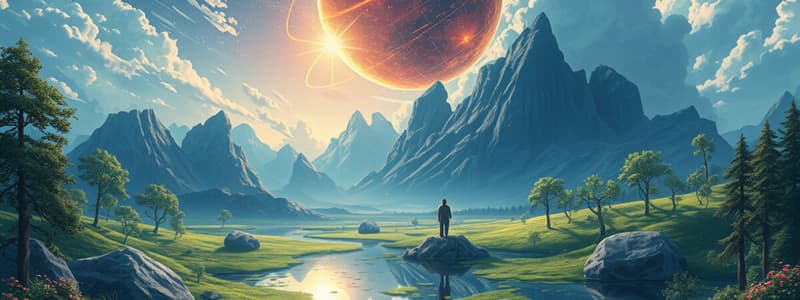Podcast
Questions and Answers
Which type of system allows both energy and matter to enter?
Which type of system allows both energy and matter to enter?
- Closed system
- Open system (correct)
- Isolated system
- None of the above
Earth is classified as an isolated system.
Earth is classified as an isolated system.
False (B)
What is the main source of energy for Earth's system?
What is the main source of energy for Earth's system?
The Sun
Water often moves between spheres in a process known as the ______.
Water often moves between spheres in a process known as the ______.
Match the following Earth spheres with their descriptions:
Match the following Earth spheres with their descriptions:
Which of the following processes is NOT part of the water cycle?
Which of the following processes is NOT part of the water cycle?
In a closed system, matter can freely enter and exit the system.
In a closed system, matter can freely enter and exit the system.
Name one process involved in moving water from the land back into the atmosphere.
Name one process involved in moving water from the land back into the atmosphere.
Which of the following best defines a closed system?
Which of the following best defines a closed system?
The short term carbon cycle operates over thousands to millions of years.
The short term carbon cycle operates over thousands to millions of years.
What process do plants use to convert carbon dioxide into glucose?
What process do plants use to convert carbon dioxide into glucose?
In the water cycle, the process in which water vapor becomes liquid is called __________.
In the water cycle, the process in which water vapor becomes liquid is called __________.
Match the component of the carbon cycle to its description:
Match the component of the carbon cycle to its description:
Which of the following processes is NOT a part of the water cycle?
Which of the following processes is NOT a part of the water cycle?
Carbon sinks are permanent storage locations for carbon.
Carbon sinks are permanent storage locations for carbon.
What happens to organic carbon from dead life forms over time?
What happens to organic carbon from dead life forms over time?
The movement of water vapor into the atmosphere from plants is called __________.
The movement of water vapor into the atmosphere from plants is called __________.
How do humans impact the long-term carbon cycle?
How do humans impact the long-term carbon cycle?
Flashcards are hidden until you start studying
Study Notes
Environmental Systems
- Closed systems allow energy to enter but not matter; examples include a closed transparent jar.
- Open systems allow both energy and matter to enter; examples are backyards and oceans.
- Isolated systems do not allow exchange of matter or energy; examples include a blast furnace or a locked cave.
- Earth operates as a closed system, primarily receiving energy from the sun while matter remains within the atmosphere, though some matter can escape naturally.
Earth's Spheres
- The atmosphere consists of gases surrounding the Earth.
- The hydrosphere encompasses all water on Earth, including oceans, rivers, and lakes.
- The lithosphere/geosphere includes all solid ground, such as rocks, ocean floors, and tectonic plates.
Interactions of Earth's Spheres
- Interactions involve the flow of matter and energy between spheres, affecting their composition and features.
- Volcanic activity in the geosphere can significantly alter the atmospheric composition, demonstrating sphere interdependence.
- Energy drives interactions among different spheres.
Water Cycle
- Water transitions between spheres and can also displace within the same sphere due to wind.
- Five main processes in the water cycle include:
- Precipitation
- Condensation
- Infiltration
- Run-off
- Evapotranspiration/Evaporation
Carbon Cycle
- Carbon is a fundamental building block of all life and is found in various Earth spheres: atmosphere, biosphere, hydrosphere, and geosphere.
- The amount of carbon on Earth is fixed and cycles through different spheres.
- Key processes in the carbon cycle include:
- Photosynthesis: Plants convert CO2 from the atmosphere into glucose.
- Absorption into the ocean: CO2 dissolves in the ocean, forming carbonic acid, contributing to ocean acidification.
- Respiration: Living organisms release CO2 back into the atmosphere.
- Decomposition: Dead organisms release CO2 into the soil and atmosphere.
Short-term Carbon Cycle
- Operates over one to several hundred years with rapid carbon exchange between living organisms, soil, and the atmosphere.
- Forests and oceans act as carbon sinks, temporarily storing carbon.
- Carbon sinks can leak carbon, indicating they are not permanent stores.
Long-term Carbon Cycle
- Operates over thousands to millions of years, involving land and oceans.
- Organic carbon from deceased organisms buried over time transforms into fossil carbon in rocks, entering the geosphere.
- Fossilized carbon is slowly released back into the atmosphere through erosion and volcanic activity, a process that occurs over extensive timeframes.
Human Impact on Long-term Carbon Cycle
- Human activities, such as combustion of fossil fuels, rapidly introduce fossilized carbon back into the atmosphere, exacerbating climate change.
- Atmospheric carbon dioxide can persist indefinitely, significantly contributing to global warming and ocean acidification and impacting the carbon cycle.
Studying That Suits You
Use AI to generate personalized quizzes and flashcards to suit your learning preferences.




